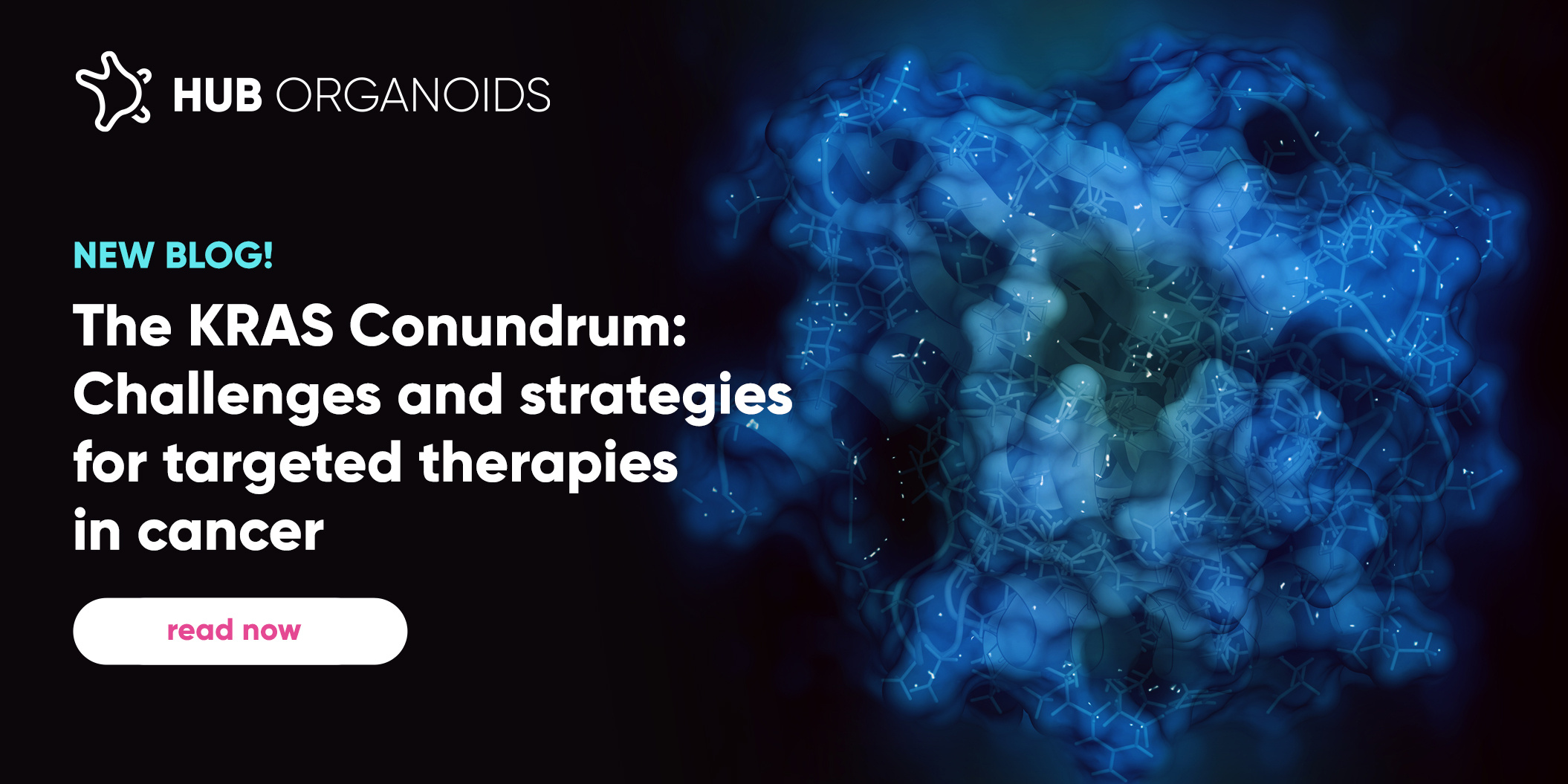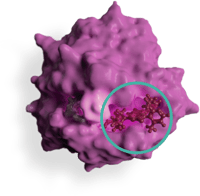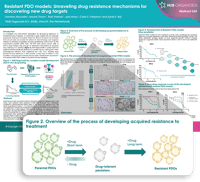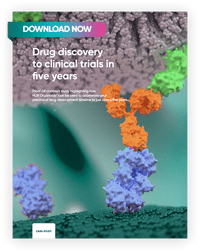The KRAS Conundrum: Challenges and strategies for targeted therapies in cancer
Published by Dnyanada Sahasrabudhe on Jul 23, 2024

KRAS is a proto-oncogene that is crucial in regulating cell growth and division. Mutations in the KRAS gene are commonly found in various cancers, including colorectal pancreatic, and lung cancers. These mutations can lead to the constitutive activation of the RAS signaling pathway, promoting uncontrolled cell proliferation and tumor growth. Targeting mutant KRAS has been a significant challenge in cancer research. But what makes these oncogenes undruggable?
Finding a lead compound or combinational treatment
While significant progress has been made in developing inhibitors for the KRAS G12C variant, other KRAS mutations, such as G12D, G12V, and G13D, remain challenging to target directly. These mutations with their unique structural and biochemical properties, make it a demanding task to design effective inhibitors. Researchers are exploring alternative strategies, such as targeting the RAS pathway's upstream regulators or downstream effectors, to address these other KRAS mutations. The availability of a range of patient-relevant preclinical models that mirror the different KRAS variants can greatly aid in the development of compounds or combinatorial treatments that can impact the viability or proliferative capacity of the KRAS mutant tumor cells.

KRASmut Screen
Evaluate the efficacy of your lead in a patient-derived organoid panel of KRAS mutations
Toxicity and Off-Target Effects
Like many targeted therapies, KRAS inhibitors may have off-target effects and associated toxicities. Ongoing efforts are focused on improving the selectivity and safety profiles of these inhibitors, as well as managing potential adverse events in clinical settings.
Addressing Tumor Heterogeneity and Clonal Evolution
Intra-tumor heterogeneity and clonal evolution can contribute to drug resistance and treatment failure. Various subclones within a tumor may harbor distinct genetic alterations or rely on specific signaling pathways to varying degrees. Preventing the emergence of resistant clones is a constant challenge in the development of KRAS oncology drugs.
Improving Biomarkers and Patient Selection
Identifying predictive biomarkers and selecting the appropriate patient population for KRAS-targeted therapies is crucial for optimizing treatment outcomes. Current biomarker strategies primarily rely on the presence of specific KRAS mutations, but additional biomarkers may be needed to predict response and resistance to KRAS inhibitors better.
Drug Resistance
One of the major challenges when treating KRAS mutant cancers is the development of resistance to KRAS inhibitors. Both genetic and non-genetic mechanisms contribute to drug resistance, and these mechanisms can vary across tumor types and even within the same tumor. Genetic mechanisms of resistance include the acquisition of secondary mutations in KRAS itself or other components of the RAS signaling pathway. These mutations can prevent the binding of KRAS inhibitors or reactivate downstream signaling cascades, rendering the inhibitors ineffective. Non-genetic mechanisms involve alterations in gene expression or epigenetic changes. which can lead to the activation of alternative signaling pathways for neoplastic transformation. To overcome resistance, researchers are exploring combination therapies that target multiple nodes of the RAS pathway or combine KRAS inhibitors with other targeted agents, chemotherapy, or immunotherapy.

Learn from our scientific poster
Resistant PDO models: Unraveling drug resistance mechanisms for discovering new drug targets
The Role of Patient-Derived Organoids in KRAS Research
Patient-derived organoids have emerged as a powerful tool in the development of KRAS-targeted therapies, offering several advantages over traditional preclinical models:
- A patient-relevant platform capturing Tumor Heterogeneity: One of the key strengths of patient-derived organoids is their ability to recapitulate the genetic and phenotypic heterogeneity of the original tumor. KRAS-mutant cancers are known to exhibit significant intra-tumor heterogeneity, which can contribute to drug resistance and treatment failure. Researchers can use organoids derived from individual patients, to study the diverse subclonal populations and their responses to KRAS inhibitors.
- Normal organoids for testing on-target off-tumor effects: Organoids, grown from both tumor tissue and non-tumorous tissue from the same patient, offer a powerful tool for drug development. This allows researchers to test KRAS inhibitors on patient-specific tumor organoids alongside their non-tumor counterparts. This approach helps identify off-target effects in healthy tissues, a key factor in drug toxicity and safety profiles.
- Studying Resistance Mechanisms: Organoids have proven valuable in investigating resistance mechanisms to KRAS inhibitors. By exposing organoids to KRAS-targeted therapies, researchers can observe the emergence of resistant clones and study the underlying genetic and non-genetic mechanisms driving resistance. This knowledge can inform the development of combination therapies or next-generation inhibitors to overcome resistance.
- Preclinical Testing and Drug Repositioning: Patient-derived organoids serve as reliable preclinical models for testing drug responses, evaluating potential toxicities, and identifying drug repositioning opportunities. Organoid biobanks can be established from virtually any epithelial patient tissue and facilitate large-scale drug screening efforts to accelerate the translation of promising compounds into clinical trials.
- Modeling KRAS Mutations: Organoids can be genetically engineered to introduce specific KRAS mutations, enabling researchers to study the effects of different mutant variants on drug responses. This approach is particularly valuable for investigating KRAS mutations beyond G12C, which have proven challenging to target directly and are less represented in the patient population.

PROOF-OF-CONCEPT STUDY
Explore the application of our KRAS mutant organoid screen in the development of a clinical candidate
Overcoming limitations in Organoid Technology
The inability to fully recapitulate the tumor microenvironment and the potential for genetic drift over time have been pointed out as limitations for patient-derived organoids. We are constantly putting efforts into refining Organoid Technology to overcome such limitations. Proper maintenance and use of the organoid cultures with the creation of sufficient cell banks that require limited expansion before using the patient-derived organoids for screening activities reduced the risk of genetic origin in our experiments. We have also developed a modular strategy in which cancer patient-derived organoids can be co-cultured with relevant cell types (tumor-infiltrated lymphocytes, cancer-associated fibroids, macrophages, or a combination of them) to recreate specific cell-cell interactions that might be relevant for assessing compounds with a particular mechanism of action. Additionally, we integrate our Organoid Technology with cutting-edge techniques, such as gene editing and high-throughput screening platforms, which will further enhance its utility in developing effective therapies for KRAS-driven cancers, offering hope for the future of cancer treatment.
Conclusion
KRAS mutations remain a formidable hurdle in cancer treatment, but significant progress is being made. Researchers are developing new strategies to overcome drug resistance, identify the most responsive patients, and target KRAS mutations beyond the G12C variant. Patient-derived organoids are emerging as a powerful tool for personalized medicine, allowing researchers to study tumor behavior and test potential therapies on a patient-by-patient basis. With continued research and innovation, KRAS-targeted therapies hold the promise of transforming the treatment landscape for many cancers.
References
1Zhu, C., Guan, X., Zhang, X. et al. Targeting KRAS mutant cancers: from druggable therapy to drug resistance. Mol Cancer 21, 159 (2022). https://doi.org/10.1186/s12943-022-01629-2
2Huang, L., Guo, Z., Wang, F. et al. KRAS mutation: from undruggable to druggable in cancer. Sig Transduct Target Ther 6, 386 (2021). https://doi.org/10.1038/s41392-021-00780-4
3Verissimo CS, Overmeer RM, Ponsioen B, Drost J, Mertens S, Verlaan-Klink I, Gerwen BV, van der Ven M, Wetering MV, Eg n DA, Bernards R, Clevers H, Bos JL, Snippert HJ. Targeting mutant RAS in patient-derived colorectal cancer organoids by combinatorial drug screening. Elife. 2016 Nov 15;5:e18489. doi: 10.7554/eLife.18489. PMID: 27845624; PMCID: PMC5127645.
4Mertens S, Huismans MA, Verissimo CS, Ponsioen B, Overmeer R, Proost N, van Tellingen O, van de Ven M, Begthel H, Boj SF, Clevers H, Roodhart JML, Bos JL, Snippert HJG. Drug-repurposing screen on patient-derived organoids identifies therapy-induced vulnerability in KRAS-mutant colon cancer. Cell Rep. 2023 Apr 25;42(4):112324. doi: 10.1016/j.celrep.2023.112324. Epub 2023 Mar 30. PMID: 37000626.
5https://www.cancer.gov/research/key-initiatives/ras/news-events/dialogue-blog/2024/development-of-mutant-kras-molecular-targets-meeting-report

.jpg)
.png)